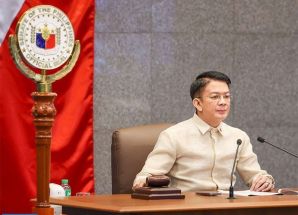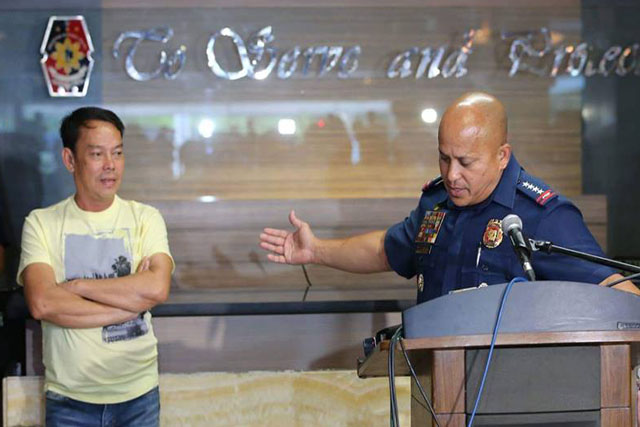A Senate breakthrough, finally

November 16, 2006 | 12:00am
 Upon learning of Sen. Juan Ponce Enrile’s resolution calling on the Senate and the House of Representatives to convene as a constituent assembly (Con-Ass) to approve amendments to the Constitution, I told myself, finally, a breakthrough. It was the first such resolution filed in the present Senate, which has rebuffed Cha-cha as part of its longstanding stand-off with the Palace.
Upon learning of Sen. Juan Ponce Enrile’s resolution calling on the Senate and the House of Representatives to convene as a constituent assembly (Con-Ass) to approve amendments to the Constitution, I told myself, finally, a breakthrough. It was the first such resolution filed in the present Senate, which has rebuffed Cha-cha as part of its longstanding stand-off with the Palace.
"Given the tenuous and volatile situation in the country, it is incumbent upon the leaders of this nation to harness their collective energies and act with resolve and dispatch, arrest the deepening crisis and provide the people with the legal, peaceful and nonviolent means to achieve the political and social change they demand and deserve." Senator Enrile was reported to have said when he filed the resolution last week.
The people’s initiative (PI) has borne out the grassroots clamor for Cha-cha. More than anything else, that’s what the Lambino Group achieved after traveling all around the country to gather signatures for the PI. It’s just a pity that the effort has gone to waste due to the Supreme Court’s majority ruling that the signature gathering was flawed because the petition itself was not attached to the signature sheets that were circulated nationwide. This contention remains under question in the motion for reconsideration that the Lambino Group filed recently.
Those who are convinced that the PI ruling deserves a serious re-evaluation should be happy that Con-Ass, which is Plan B for Cha-cha, is now getting its much-deserved attention from the Senate.
At the very least, Senator Enrile said his resolution would provoke a debate in the Senate regarding Cha-cha. While the senator has not proposed a definite timetable for Con-Ass, he did concede that time is of the essence regarding amendments to protectionist economic provisions in the 1987 Charter. Senator Enrile has conceded that such protectionist provisions have stunted the country’s economic growth.
Representatives of foreign businesses in the country have placed a price tag on the underdevelopment spawned by these protectionist provisions. Dr. Michael Clancy, president and CEO of the Philippine Business Leaders Forum, reported during a workshop that as much as $3 billion in foreign direct investments (FDIs) could be generated per year over the next four years if constitutional and legal impediments were addressed immediately. The matter was tackled in one of the workshops of the FDI Forum held last month, wherein representatives of foreign investors drew up an action plan on how the Philippines could attract $3 billion a year in FDIs.
According to Dr. Clancy’s presentation, if we remove any restrictions on foreign ownership of land, we would open up our economy to some 1,000 non-retiree foreigners who buy land. Given a budget of about $50,000 each, these non-retiree foreigners could easily put in $50 million per year. It added that if we remove any restrictions on foreign ownership of educational institutions and mass media, $10 million in FDIs could flow into each sector per year.
Moreover, if 100-percent foreign ownership were allowed in public utilities, foreign investors could come in with $2.5 billion in fresh investments between 2009 and 2010. Finally, if the FDI threshold in retail and non-retail businesses were removed, 500 new firms in each sector could come in. At the minimum, these new firms would pump some $50 million in fresh funds into these sectors.
Giving immediate attention to constitutional and legal impediments to FDIs is crucial to the take-off scenario that foreign investors believe could happen in the Philippines. Under this take-off scenario, the country would be at the receiving end of $9 billion in FDIs per year over the next four years. Other key assumptions to this economic take-off are global growth at around 3.6 percent per annum, improving governance and discouraging rent-seeking behavior, and completion to international standards of some major infrastructure projects. The foreign chambers’ take-off scenario assumes that Congress would pass constitutional amendments by next year and implement the legislation by 2008.
The Joint Chambers of Commerce (JCC) had come out with a statement exhorting that "if the country merely continues to muddle through with a ‘business-as-usual’ approach, it will not become more competitive, unemployment and unrest will increase, and the great potential of the Philippines will remain unrealized." The JCC, by the way, is composed of the American Chamber of Commerce of the Philippines, Inc.; Australian-New Zealand Chamber of Commerce of the Philippines, Inc.; Canadian Chamber of Commerce of the Philippines, Inc.; European Chamber of Commerce; Japanese Chamber of Commerce of the Philippines, Inc.; Korean Chamber of Commerce & Industry of the Philippines, Inc.; and the Philippine Association of Multinational Companies Regional Headquarters, Inc.
That the Senate has been muddling through on Cha-cha is probably on account of the fact that the opposition, despite many of its members’ acknowledged belief that Cha-cha is long overdue, wants to delay any action on this crucial issue until it has wrested control of government from the Arroyo administration. Well, not only may that time not come at all, it’s patently irresponsible to hold Cha-cha hostage to a political power play. Justice Antonio Carpio would call it "cavalier".
For sure, given the turf war that is at play on how to get Con-Ass under way, we still have a long way to go in actually seeing this mode for Cha-cha prosper. I just hope that, like Senator Enrile, the rest of our senators will make an enlightened decision to foster progress in our country, instead of endlessly bickering about who gets to eat the cake. If they get to play this catalystic role, the present Senate will have redeemed its worth in our nation’s journey. Instead of going down in history as one of the most contentious gatherings of this august body, it can instead be remembered as among the most progressive.
BrandSpace Articles
<
>
- Latest
- Trending
Trending
Latest




























